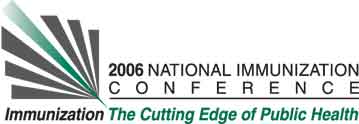Ruth S. Gubernick, AAPNJ/PCORE, Cherry Hill, NJ, USA,
Adrienne Millican, Gateway Northwest Maternal & Child Health Network, Newark, NJ, USA, Dorothy A. Williams, Vaccine Preventable Disease Program, NJ Dept. of Health and Senior Services, and Arlene Patrick, Catholic Charities, Diosese of Metuchen - Health Services Div.
Learning Objectives for this Presentation:
By the end of the presentation, participants will be able to:
Demonstrate an understanding of the approaches, change concepts, and tools used in an improvement project.
Explain how an immunization registry can support improvement.
Choose a spread framework for dissemination of the project in their state or practice.
Background:
New Jersey's Improving Preventive Services Project (NJIPSP) is a collaborative to improve immunization service delivery at primary care sites, with the integration of the statewide immunization registry (NJIIS) into the provider's practice.
Objectives:
To present results from the pilot and initial “spread” phase of NJIPSP, a collaborative network of primary care sites, the NJ Dept. of Health and Senior Services, the American Academy of Pediatrics/New Jersey Chapter's Pediatric Council on Research and Education (PCORE) and the National Initiative for Children's Healthcare Quality (NICHQ).
Methods:
The NJIPSP uses an “enhanced” learning collaborative model, with practice teams working with expert faculty during three learning sessions, utilizing a Model for Improvement, sharing innovative solutions, participating in monthly conference calls, a list serv and receiving on-site support. The NJIIS is used to calculate monthly improvement.
Results:
As a result of the pilot project:
100% are now using the NJIIS to:
• Identify patients' needs at every visit
• Remind and recall patients
67-83% reported use of the NJIIS highly effective and 83-100% found it easily adoptable
• 50% increase (to 100%) checking immunizations at sick visits.
• 33% increase (to 100%) using chart prompts
• 33% decrease prefilling syringes
• 16% increase (to 100%) conducting in-service trainings
Mentoring opportunities in “spread” phase keep pilot practices engaged.
Conclusions:
Improvement of immunization delivery is possible with innovative technology and a plan for continuous quality improvement. Utilizing a registry supports easy improvement measurement. NJIPSP is a model to be spread to other states.
See more of Immunization Information Systems Partnerships to Improve Delivery and Outcomes
See more of The 40th National Immunization Conference (NIC)

